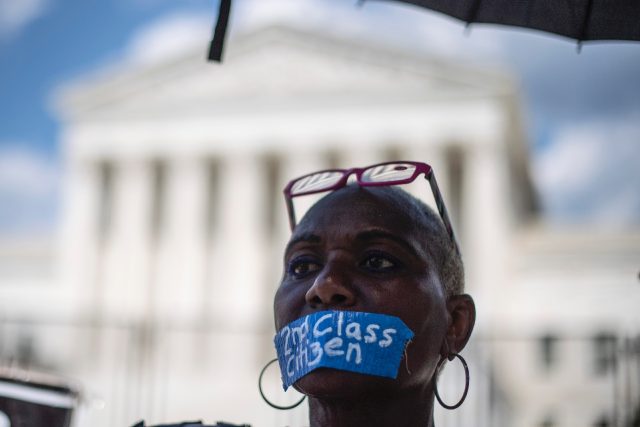The US Supreme Court’s ruling ending the nationwide right to abortion was one of the most seismic domestic political shifts in a generation — upending the crucial midterm elections that will decide who controls Congress next year.
Republicans are celebrating the culmination of almost 50 years of activism around the argument that Roe v. Wade — the 1973 landmark ruling guaranteeing federal protection of abortion rights — was wrongly decided.
Democrats, too, have been galvanized by the scrapping of half a century of reproductive rights, and by fears Republicans will go further and introduce a federal abortion ban if they retake Congress — threatening legal access nationwide.
Democratic President Joe Biden and House Speaker Nancy Pelosi set out what they see as the stakes on Friday, with both saying abortion would be “on the ballot” in November.
The issue has traditionally animated conservatives more than liberals but the Supreme Court may permanently have altered the political topography, analysts say.
“By striking down Roe, this is likely to create a new constituency of pro-choice voters who are activated to turn out and donate in ways that they would not normally in a midterm election,” Shana Gadarian, a professor of political science at Syracuse University, told AFP.
“The Roe decision not only has a major effect on the midterm elections, but it paved the way for greater implications on human rights as a whole,” Democratic political strategist Amani Wells-Onyioha added.
“The conservative right has made it clear that it intends on coming for contraception, the LGBT+ community, and African Americans next.”
Mixed messaging
A new NPR/PBS NewsHour/Marist poll out Monday showed a whopping 78 percent of Democrats believe the court’s decision made them more likely to vote in November — 24 points higher than Republicans.
Democrats are leveraging this and several recent similar polls to make the case that the position adopted by Republicans across the country is far outside of the mainstream.
The party sees it as galvanizing for its liberal base but also, according to Democratic pollster Carly Cooperman, a mobilizing issue for the moderate suburban women the party is trying to peel away from the Republicans in battleground House districts.
“Republicans will do everything possible to turn the conversation back to inflation, the economy, and high gas prices,” Cooperman told AFP.
“At a time when Democrats have consistently shown less enthusiasm for the midterms compared to Republicans, the question will be how much the court’s ruling will narrow this gap.”
Gerard Filitti, senior counsel at the New York-based Lawfare Project think tank, argues that Democrats may be able to reframe the midterms as a battle over fundamental rights rather than the cost of living.
“Concern over civil rights may well trump concerns over the economy, and the Republicans are no longer assured a clear path to victory in the November midterms,” he said.
The Republicans’ messaging has been mixed, with many members of Congress and state governors rushing to celebrate a historic victory while others prefer to keep the focus on the cost of living and economic uncertainty.
‘Win for life’
Republican leader and former president Donald Trump called the decision “the biggest win for life in a generation” while Adam Laxalt, the Republican Senate nominee in Nevada, said the issue “won’t distract voters from unaffordable prices, rising crime or the border crisis.”
The decision set off a frenzy of activity on both sides, with at least eight states imposing immediate bans and a similar number expected to follow suit within weeks.
Dozens of arrests were reported during a weekend of nationwide protest — although incidents of violence and vandalism were isolated.
Mississippi, Utah and Louisiana have been hit with lawsuits seeking to block their bans. The plaintiff in Mississippi, abortion provider Planned Parenthood, said it will spend $150 million on the midterm elections, alongside NARAL Pro-Choice America and Emily’s List.
In Congress, Senate Minority Leader Mitch McConnell has suggested that a federal ban would be “possible,” although he has also acknowledged that no position on the issue has ever achieved the upper chamber’s 60-vote threshold.
“It will be important to see how Republican candidates campaign after this Supreme Court decision,” Lyle Solomon, a California-based principal attorney at Oak View Law Group, told AFP.
“If they campaign on abortion restrictions and focus a lot on the Supreme Court decision being a victory, it may backfire on them. On the other hand, Democrats will be looking to take full advantage of the Supreme Court decision and rally voters around the message of abortion rights and access to safe abortion.”

COMMENTS
Please let us know if you're having issues with commenting.